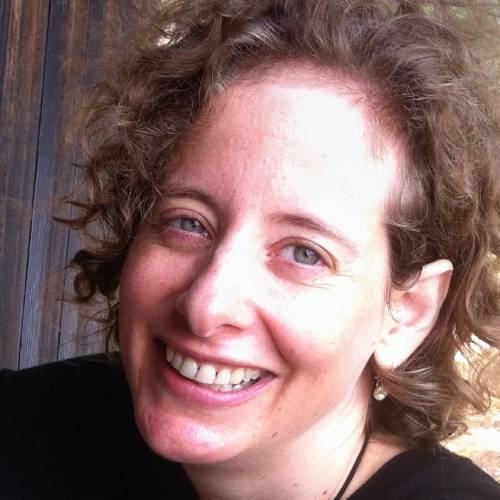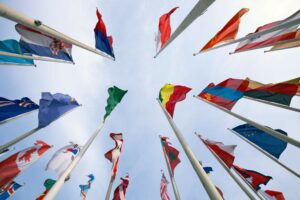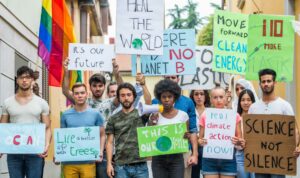Sustainability educators are mostly dissatisfied with their teaching resources. Moving forward requires diverse tools and a new look at assumptions.
Lessons from the AMLE issue on Teaching Sustainability
What does effective sustainability education look like?
For the editors of a recent journal special topic section on this topic, using diverse teaching resources is central.
Alberto Aragon-Correa (University of Granada), Alfred Marcus (University of Minnesota), Jorge Rivera (George Washington University), and Amy Kenworthy (Bond University) edited the Academy of Management Learning and Education book and resource review special topic section on “Teaching Sustainability” (September 2017).
The special section features an introductory essay and reviews of seven different types of resources, from case studies to apps.
In the essay, the editors share results from a survey of 169 sustainability management educators about the sustainability resources they use and what they’re trying to achieve. (The educators surveyed are subscribers to the Academy of Management’s ONE-L and SIM list-servs).
Results suggest that sustainability education is making progress but hasn’t yet reached its goals, say the editors. New educational resources support more diverse and powerful educational approaches. But some fundamental challenges around the purpose and implementation of sustainability education remain unresolved.
Diverse tools support a comprehensive approach
A few types of teaching tools are most popular among sustainability educators, according to the editors’ survey. Case studies and videos are widely used, with academic papers emphasized for graduate courses.
These kinds of traditional resources have merit. For example, says Rivera, the textbook, another old standard, can be useful for showing complexity and integrating knowledge from multiple disciplines.
But more novel educational approaches — simulations, apps, databases — can be valuable complements. In the age of Big Data, students need to know how to identify, access, and thoughtfully analyze information from online resources like large databases. Apps are tools that are increasingly familiar to most students, providing them with opportunities to access current information through personalized investigation on mobile devices.
“It’s surprising for some people to look through the special topic section and see things like an online database,” says Rivera. Newer approaches are “not the right way or only way — but they are important things to consider.”
“Diversity of resources is a critically important part of our educational approach today,” says Kenworthy. “This is how we need to be teaching – using a variety of accessible and often familiar tools tailored to our students’ skills, interests, and educational needs.”
In the special topic section, reviewers assess these options:
A teaching case, on Monsanto’s operations in India
An app, GoodGuide, for product evaluation
A simulation, Saving the commons
A TED talk by Johannes Rockstrom
A database, the Toxics Release Inventory
A textbook, the Business student’s guide to sustainable management principles and practice
A book, Innovations in sustainability
Better education requires more integration
New educational resources are exciting, but sustainability education still faces challenges.
The editors’ survey shows that sustainability educators are “mostly dissatisfied with the…quality…of the teaching resources.” The editors asked about different dimensions of quality, and saw the greatest concern around how resources are integrated, with each other and into general curricula.
The need for integration plays out in different ways. It’s partly about sustainability being siloed into elective classes, rather than integrated throughout a curriculum.
It’s also about the need for sustainability educators to emphasize the topic’s connection to other issues. “Educators need to take a broad approach and global scope,” says Kenworthy. “People think sustainability is just climate change or the environment and engaging in activities like picking up garbage. It’s not. Sustainability issues are incredibly comprehensive and often complex. We need to work harder in colleges and universities to do justice to these issues across all of our courses and topic areas.”
Teaching about an issue that touches on so many others can be challenging. Inevitably, sustainability requires integrating different disciplines: for example, policy, science, and law in addition to management. “This requirement places a burden on…faculty,” the editors acknowledge in their written article.
While integration is a major issue, the editors also identified other ways to advance sustainability education:
Go beyond describing sustainability practices, and provide students with guidance on how to implement and evaluate them.
Incorporate teaching best practices, such as representative cases, vivid illustrations, and experiential learning.
Consider how sustainability and business success can be mutually reinforcing. “Our job is to make sure businesses succeed,” says Rivera, “but in ways that support the world around them.”
Sustainability educators are committed
For the editors of this section, the experience of pulling together the essay and resource reviews highlighted the passion and commitment that sustainability educators feel.
The editors were “swimming in a sea of great ideas,” says Rivera. “Everyone we asked to contribute showed interest.” The special topic section expanded as grew as more people became involved and new ideas arose. “Ultimately, we had to say, ‘There’s just no more room,’” Rivera recalls.
“Sustainability is a critically important topic in education,” says Kenworthy, “it’s a topic that permeates everything we do. For people who are working in this area, there is a great deal of enthusiasm and passion. It’s emotionally charged. It’s energizing. It’s what we know we need to be doing. But we can’t stop here. There is so much more to be done.”
The AMLE special topic section on teaching sustainability captures this energy and commitment — and identifies directions for additional impact. Read the section, and share your insights on sustainability education’s current state — and future journey.
See the special topic section
Aragon-Correa, A., Marcus, A., Rivera, J., & Kenworthy, A. (Eds.). 2017. Teaching sustainability [Special section]. Academy of Management Learning and Education, 16(3), 469-503. https://journals.aom.org/doi/10.5465/amle.2017.0180



Add a Comment
This site uses User Verification plugin to reduce spam. See how your comment data is processed.This site uses User Verification plugin to reduce spam. See how your comment data is processed.